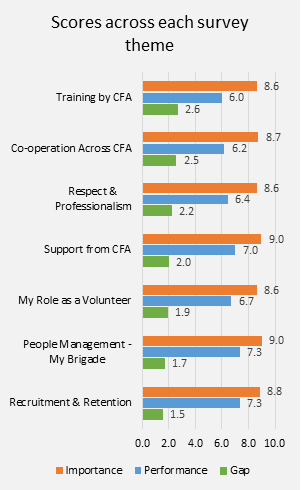2014 VFBV Volunteer Survey - Executive Summary
Observations from the survey results that may warrant further investigation and possible actions include the following:

- Training needs and expectations.
The 2014 survey results identify training by CFA as the biggest issue, with the survey gap at 3.0. This remains the most important issue for CFA volunteers and the issue least meeting volunteer expectations.
- Variation between brigades.
Brigades with an integrated volunteer/career mix of personnel are more concerned with performance in relation to people management within their brigade, cooperation and respect and professionalism. Survey comments point to ongoing issues at integrated brigades that require further attention.
The integrated volunteer/career survey responses consistently scored lower on importance and more so on performance. Integrated brigades scored poorly on performance in relation to workplace bullying, conflict resolution, volunteer consultation, morale and supporting new volunteers. These particular statistical results point to ongoing issues within integrated brigades that require specific attention.
- Equity, diversity and workplace behaviour.
Survey results show that equity and diversity across gender, race and religion are important issues to volunteers. Generally, female survey respondents rated CFA respect, professionalism, volunteer support and brigade support more highly than males across both importance and performance. The differences occur when the questions relate to CFA’s performance in conflict resolution, bullying and harassment, in which case, females rate the management of such issues lower than males.
When tested against gender – female respondents rated both importance and performance lower than male respondents in relation to the statement “there are no barriers to the roles women can occupy in my brigade”. The gap between importance and performance for female respondents was higher than male, signalling that male respondents are more optimistic about how gender, equity and diversity issues are being managed and may not realise areas of deficient approach.
Whilst CFA performance in this area is scored comparatively well against other areas, it remains an area that shows that a gender perception gap still exists in brigades and will require ongoing support.
- The importance of consultation with brigades.
The value volunteers place on consultation both within their own brigade and with CFA is expressed in the survey results where statements referring to consultation within brigades receive good performance scores. Conversely, statements regarding effective consultation at CFA District, Region or Corporate level, receive the lowest performance scores and high gaps.
Written comments from survey respondents refer to issues where inadequate consultation may be the root cause, further suggesting that more work is required to improve consultation between CFA and volunteers.
- The influence of volunteer length of service.
Volunteer length of service has created a distinct pattern across the question responses. Volunteers who have served with CFA for less than one year are the most positive about the organisation and their brigade on nearly every question. The gap sharply increases after their first year of service, i.e. their level of satisfaction drops sharply after one year and then again after more than five years’ service.
- Satisfaction.
80% of 2014 survey respondents are satisfied with their role as a CFA volunteer and 87% intend to continue their membership. The overwhelming reasons for being a CFA volunteer are “to help protect the community I live in” or “a sense of fulfilment in supporting my community in a meaningful way” (total 94%).
Only 59% of volunteers are satisfied with the way they are treated by CFA, this comparatively low satisfaction score suggests that the greatest potential impact on future volunteer welfare and efficiency sits with CFA in the success or otherwise of their partnerships with volunteer brigades.
- Overall.
Overall results across the survey themes (see the graph to the right) show the greatest gaps to be in the training and cooperation themes, and the smallest gap in the recruitment and retention theme. Specific responses within each theme are explained in greater detail in the body of this report.
The analysis of the survey results shows that there are still differences of opinion between genders as to how women are treated in CFA, between volunteer and integrated brigades on how CFA staff treat volunteers, and difference of opinion on how well CFA is performing depending upon how long the volunteer has known CFA.
These differences point to an ongoing need for CFA to improve its culture. The attitudes and norms across CFA need to become more inclusive and more respectful – in terms of volunteer value to the organisation.
VFBV Welfare & Efficiency Survey 2013 – the results
The third VFBV Volunteer Welfare & Efficiency Survey will be online in the middle of 2014. To pre-register to receive the 2014 survey via email, click here.
The survey is a total of 33 questions chosen by volunteers and takes about 15 minutes to complete. Your answers are confidential.
Last year’s survey was a great success with more than 1,400 participants. VFBV examined the results in detail to guide its own actions and briefed the CFA Board. Download the full report below.
The third survey will show trends in volunteer opinions on issues chosen by your fellow volunteers and if you register today you’ll receive the survey automatically as soon as it opens.
Download the full report below
VFBV’s role under the CFA Act is to ‘consider and bring to the attention of the Authority (CFA) all matters affecting volunteer welfare and efficiency (other than questions of discipline and promotion).
Earlier this year, VFBV conducted its second survey to measure volunteer perceptions about key matters that volunteers feel impact on their welfare and efficiency.
There was again a tremendous response, with more than 1,450 participants – an 80% increase over the 2012 survey – with more volunteers responding from every District, and greater percentages of female volunteers, younger volunteers and newer volunteers.
The survey gave volunteers the chance to improve the future welfare and efficiency of CFA volunteers and to better equip VFBV for its work.
You can download the full results of the 2013 survey below.
The first survey was well received by CFA’s Board and senior management in 2012, and VFBV now looks to working with CFA in moving from identifying areas needing attention to actively working to achieve improvements in those areas.
Every person who has completed the survey and provided contact details will be sent a full copy of the survey.
The survey is designed to provide a benchmark assessment of CFA volunteers’ perceptions about key factors affecting their welfare and efficiency.
Ongoing surveys will allow us to compare results with the earlier surveys and identify ongoing trends. To pre-register to receive the 2014 survey via email, click here.
VFBV will now continue work with CFA to explore reasons behind key performance gaps; recognise and promote good practice; find solutions to address identified weaknesses; and provide the starting point for future trend analysis and continuous improvement.


